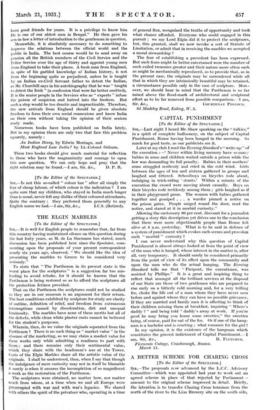THE ELGIN MARBLES [To the Editor of the SPECTATOR.] SIR,—It
is well for English people to remember that, far from this country having maintained silence on this question during the last forty years, as M. de La Sizeranne has stated, much discussion has been published here since the Spectator, com- menting upon the proposals of your present correspondent nearly six years ago, observed, " We should like the idea of presenting the marbles to Greece to be considered very seriously."
To state that " The Parthenon in its present state is the worst place for the sculptures " is a- suggestion- far too mis- leading to avoid rebuke, for it should be known that the Parthenon is being restored so as to afford the sculptures all the protection Ictinos provided.
That on the Parthenon the sculptures could not be studied as they are in our museum is an argument for their return. The best conditions exhibited by sculpture for study are clarity of outline, definition of relief, and freedom from extraneous interruptions caused by discoloration, dirt and unequal luminosity. The marbles have none of these merits but all of the defects, while clean white plaster casts cannot be bettered for the student's purposes.
Wherein, then, do we value the originals separated from the Parthenon ? There is no such thing as " market value " in the absence of the marketing, so we may claim a market value for these works only while admitting a readiness to part with them ; and there remains only their sentimental value, which they share with the headsman's axe at the Tower. Casts of the Elgin Marbles share all the artistic value of the originals. I shall be understood, then, when I say that though the indulgence of mere curiosity may not in itself be blamable it surely is when it ensures the incompletion of so magnificent a work as the restoration of the Parthenon.
The -sculptures were obtained, no matter how, nor matter much from whom, at a time when we and all Europe were preoccupied with war and with war's legacies. We shared with others the spirit of the privateer who, operating in a time
of general flux, recognized the truths of opportunity and took what chance afforded. Everyone who could engaged in this pursuit ; we say Lord Elgin did it to protect the sculptures, but, this granted, shall we now invoke a sort of Statute of Limitation, or admit that in receiving the marbles we accepted a moral stewardship ?
The fear of establishing a precedent has been expressed. But such fears might be better entertained were the number of such exiled treasures greater and their nature more often such as might be mechanically reproduced, so to provide that, as in the present case, the originals may be surrendered while all that in which they are intrinsically beautiful may be retained, a circumstance possible only in the case of sculpture. More- over, we should bear in mind that the Parthenon is so far raised above the flood-mark of architectural and sculptural effort as to be far removed from possible comparison.—I am, Sir, &c., COURTEKAY. POLLOCK. 92 Madeley Road, Ealing, TV. 5.


















































 Previous page
Previous page